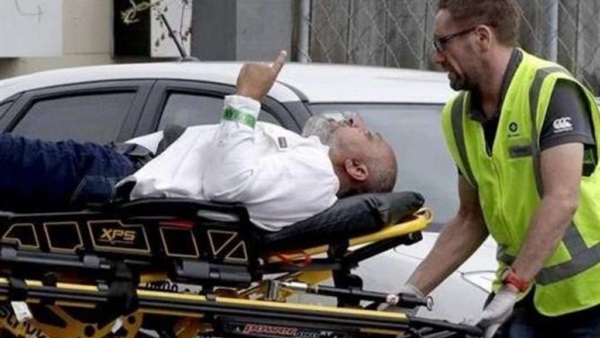New Zealand massacre attests to widening scope of Islamophobia

No sooner had the man took off his shoes before entering the mosque, than he was shot several times and died.
At this moment, Moussa Bwari, a Moroccan student living in New Zealand, was searching for a parking lot for his car and planned to enter the same mosque.
He, however, turned away after hearing the roaring of the machine gun used in killing the people inside the mosque.
The massacre inside two mosques in Christchurch left 49 people dead and more than 20 others injured.
"I dropped my wife in front of the mosque before I searched for a parking lot for the car," Bwari said. "When my wife heard the gunshots, she hid inside a nearby house for more than an hour."
Bwari added that his wife heard the screams of the victims.
"It was like a nightmare," he told the Moroccan news agency, a short time after the attack.
From Quebec to Christchurch
On January 29, 2017, Alexander Bezonite, armed with a rifle, passed through the main entrance to the Quebec mosque in Canada and shot with cold nerves about 40 men and four children after prayer. Six of the victims held dual nationality. They were migrants.
This attack was much similar to the one that took place on March 15 in Christchurch in New Zealand.
The incident was carried out in the same way, with different casualties and similar motives, namely targeting Muslims. The 28-year-old attacker said he perpetrated the crime because he was afraid that his country would receive immigrants and refugees after Canadian Prime Minister Justin Trudeau said he would welcome Arab refugees.
The same thing was written by Brenton Tarrant, the 28-year-old New Zealand attacker on his Facebook page.
He said he carried out the attack to "directly reduce immigration to Europe."
It can be presumed that Tarrant had learned a lesson from the way the attack was carried out in Canada.
Solving Tarrant's mystery
In a puzzling scene, several words and numbers appeared on the weapons used by the attacker, including the date "1621". This date refers to the Khotyn Treaty, which was signed at the end of the Ottoman-Polish war.
The name "Felix Kazimierz Potoki" was also written on the weapons used by the attacker. This was the name of a seventeenth-century Polish military commander. The name "Charles Martel", a French military commander who emerged in the eighth century, was also written on the same weapons along with references to old battles and recent attacks against Muslims.
The attacker also listed the names of his role models, including the Quebec mosque attacker.
Islamophobic scope widening
Islamophobia emanating from fears from Islam has triggered numerous attacks against Muslims. Sorry to say, the states where these attacks take place take little action to prevent a repetition.
The terrorist attack in New Zealand was the second against mosques in the first quarter of 2019. It was preceded by a bomb attack on a mosque in the Philippines on January 30. The attack left two preachers dead and four people injured.
The movement Patriotic Europeans Against the Islamisation of the Occident, which is widely known as Pegida, is involved in carrying out several racist attacks against mosques: including writing words offensive to Prophet Muhammad.
The movement organized a demonstration in January outside a mosque in central Dutch city of Utrecht. During the protest, movement leaders delivered racist speeches against Muslims.
The Islamophobia unit of the Organization of Islamic Cooperation said racism against Muslims had reached its peak at the end of 2018.
It said fear from Islam became official behavior. It referred to news revealing an alarming increase in hate crimes against individuals perceived as Muslims, as well as a high number of attacks on mosques and community centers, particularly in Europe and the United States.
The unit pointed out that Islamophobia appeared to be an irrational reaction by some governments in the face of the issue of extremism because of the clear blame on all Muslim communities without exception.
OIC Secretary-General, Yousef bin Ahmad Al-Othaimeen, said his organization seeks to monitor the cases of violence and hatred in order to document and submit them in particular to the Council of Foreign Ministers of Member States, stressing the organization's keenness to increase global awareness of the clear danger it represents.
Why mosques?
Some Western countries, such as Germany, where mosques are subjected to successive attacks, have no classification of political crimes.
Attacks against Muslims or mosques are categorized in Germany as hate crimes or xenophobia ".
"The phenomenon of Islamophobia is the other side of Western racism towards Islam and Muslims," said Tariq Abu Hashima, head of the Strategic Studies Unit at the Egyptian Fatwa Center. "There is no doubt that this phenomenon has reasons and reasons that justify its growth.
Recent statistics show that Islam is spreading widely in the West, compared to other religions. The number of Muslims in Europe is expected to represent 10% of the population by 2050.
Abu Hashima said that there is no doubt that Western media played the most prominent role in distorting the image of Islam and creating another hostile image of it.
This media, he said, portray the actions of Islamic extremists as a sign of the actions of the vast majority of Muslims.







